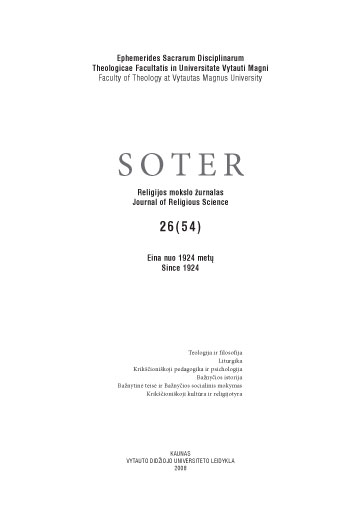Popiežiaus Jono Pauliaus II mokymas Bažnyčios švietimo kontekste
THE TEACHING OF POPE JOHN PAUL II IN CONTEXT OF EDUCATION OF THE CHURCH
Author(s): Algis BaniulisSubject(s): Christian Theology and Religion
Published by: Vytauto Didžiojo Universitetas
Keywords: popiežius Jonas Paulius II; Kristus; Bažnyčia; enciklikos; Vatikano II Susirinkimo nutarimai; Pope John Paul II; Christ; Church; encyclicals; Vatican Council II decrees.
Summary/Abstract: Research subject: Teaching of Jean Paul II on the Church in today’s world. Research purpose: To show the teaching of John Paul II in the context of the Church’s education. To achieve this purpose, the following steps have been undertaken: 1. Presenting the Church as the reality of God’s people. 2. Pointing out to the efforts of the Church and Pope for achieving peace. 3. Bringing to light the ecumenical traits in the life of the Church. 4. Showing the Church as the promoter of social justice in the people of God. Research method: Analyzing and synthesizing various documents of the Church. In his encyclical “Redemptor hominis” Pope John Paul II points out to the huge work accomplished by Vatican II in forming the consciousness of the Church, stimulating inter-religious dialogue and understanding her own mission in today’s world. He says that the mission of the Church is to continue the work initiated by Christ. And Christ came to testify to the truth, to save and to serve. It is very important for every man and woman to understand that mission by which they get into intimate contact with all cultures, all world outlooks and all good-willed people. We all are entrusted to the care of the Church, and her care intends to the entire man. It has pleased God not to sanctify and save man and women individually. He wanted to form a people that would acknowledge and serve him in holiness. Christ made a new covenant with them in his blood (cf. 1 Cor 11, 25) and called all, Jews and pagans, to form a people that would grow one in the Spirit. In the said work the Pope speaks of the Church as God’s people using the concepts “ad intra” and “ad extra”. He intends by that to say that wide layers of mankind – in theologically different ways – are also found in the exterior of the Church. Here comes to light that all men and women are included in God’s fatherly plan and all are redeemed by Christ. In both directions, ad intra and ad extra should go the process of deepening and enriching our faith. This people of God, remaining one and unique, has to expand throughout the world and at all ages. The Pope ardently desired that all lived in peace. Soon after ascending the papal throne, already on the second day, in his letter “Urbi et Orbi” he expressed his fidelity to peace. This theme constantly sounded in his speeches on his visits to various parts of the world. John Paul II has created an entire peace philosophy that the whole Catholic Church now uses for her orientation. It was the Pope’s conviction that the source of all evil, including the armament race, is materialism, consumerist customs of the society, atheisation. John Paul II also attaches great importance to the unity of Christians. The Church never ceases to pray and work for it; she exhorts her children to purify themselves from mutual enmity. Te Pope desires to see the Church renewed. “That all may be one as you, Father, are in me, and I in you” (Jn 17, 21). Have we gone far on this road? We
Journal: SOTER: religijos mokslo žurnalas
- Issue Year: 54/2008
- Issue No: 26
- Page Range: 7-20
- Page Count: 14
- Language: Lithuanian

